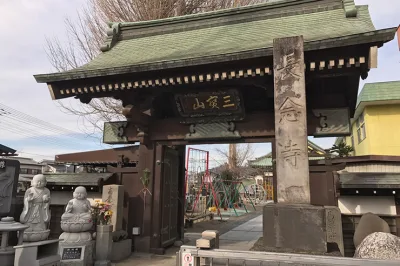Are you looking for a slightly off-the-beaten-path destination near Tokyo? Come to Ota City in Gunma to walk the short Seven Lucky Gods pilgrimage! Walking this route is also supposed to insert some more luck in your life, so what are you waiting for?

Pilgrimage
If you think about a pilgrimage in Japan, the very long route in Shikoku will probably spring to mind first. While it is an amazing experience to walk (or ride) a part of this route if you have less time and energy you can also take a shortcut to luck. There are many longer and shorter pilgrimage routes in Japan, and a lot of them are dedicated to the Seven Lucky Gods.
The seven gods of good fortune have been worshipped for centuries by the Japanese people. The seven gods in Joshu Ota (Ota City in Gunma) are enshrined respectively at the seven temples located at the foot of Kanayama Hill. Ota is located a 1.75-hour train ride away from Tokyo station. It is highly recommended that you visit all the seven temples to admire their beauty and the environment. Added bonus: you will gain good fortune for a whole year if you make the whole round!
Seven Temples in Ota City
So which temples are on the route in Ota City, and what are their individual specialisms? Let’s start with the temples that are connected to wealth:
Chonen-ji (Chonen Temple): Ebisu (the god of wealth)
In the Edo Era, messengers to dedicate the offerings to the gods of the Emperor had to first register their arrival at this temple. In the Meiji Era, this temple also served as a boys’ high school. Visitors come here seeking good business, wealth and happiness.
Juraku-ji (Juraku Temple): Daikokuten (the god of wealth)
This temple was built in 1384. It was once relocated, burnt, and reconstructed. The gate shows you its history. Visitors come here seeking abundant food and fulfillment of their aspirations.
Daiko-in (Daiko Temple): Benzaiten (the goddess of music, eloquence, wealth, and wisdom)
This temple was constructed in 1613 by shogun Ieyasu Tokugawa as a memorial temple for Yoshishige Nitta, the founder of the clan. It is known as Kosodate-Donryu-sama, named after the first priest Donryu. Visitors come here seeking the acquisition of riches, happiness, and attainment of studies.
Gyokugon-ji (Gyokugon Temple): Fukurokuju (the god of happiness, wealth, and health)
The historical gate of the temple appears at the top of the stone steps, lending a quiet and elegant atmosphere to this location. Visitors come here seeking to bring about happiness and increase salary.
Other Types of Luck
The next four temples are connected to other types of luck:
Kinryu-ji (Kinryu Temple): Bishamonten (the god of wars and the guardian god of Buddhism)
This temple was constructed by Sadauji Yokose to worship his grandfather Yoshisada Nitta. A wooden statue of Yoshisada is enshrined here. Visitors come here seeking success in their occupation, and improvement of their fortune.
Eifuku-ji (Eifuku Temple): Jurojin (the god of longevity)
It is not certain when this temple was built, but it was relocated to this site by Sadauji Yokose, the lord of Kanayama Castle, in 1417. Visitors come here seeking good health and longevity.
Sogen-ji (Sogen Temple): Hoteison (the god of happiness)
This temple is also called Sazae-do (a turban shell temple) because of its style of architecture. The hydrangea garden is especially worth visiting. Visitors may come here seeking happiness and the safety of their families.
If you are looking for a different, private tour where you can connect with the seven gods of fortune, then the path of the seven temples of Ota may be a great tour for you.
Your Japan Tour
As seasoned Japan experts, we create perfect Japan package tours including off-the-beaten-path areas or pilgrimage routes. Check out our group tours and private tours, or contact us to start planning your unforgettable holiday to this fascinating country. Japan is full of once-in-a-lifetime experiences, culture, history, nature, and delicious food!